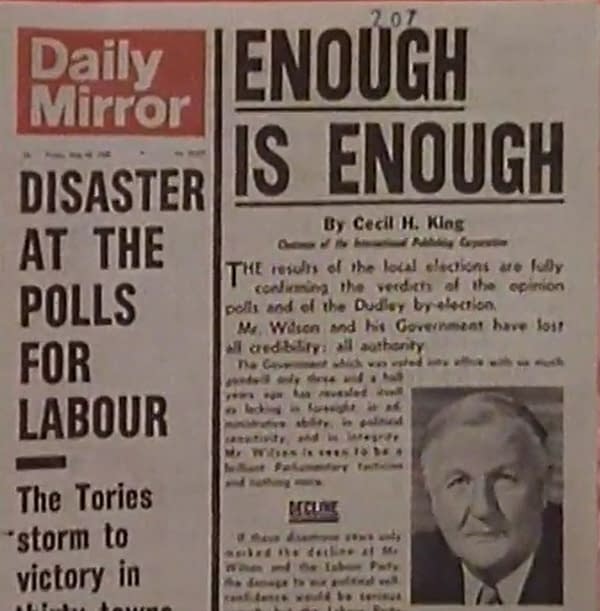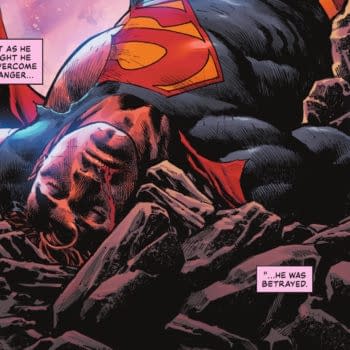Posted in: Comics, Comics Publishers, Current News, Rebellion / 2000AD | Tagged: Cecil King, judge dredd, politics
Chairman of Judge Dredd's Publisher Tried To Depose UK Prime Minister
Cecil King was Chairman of IPC, publishers of Judge Dredd and 2000AD, and tried to launch a coup to depose the Prime Minister.
Article Summary
- Cecil King, ex-IPC chairman, plotted to oust UK PM Harold Wilson.
- IPC, the original publisher of Judge Dredd, was once world's largest.
- King's media power play backfired, leading to IPC demanding his exit.
- IPC's comic legacy ended with sale to Rebellion, as depicted in The Crown.
Since Britain is all of a buzz with politics, I thought it might be worth looking at the history of Cecil King and his role in a planned coup against the state. And the role his publisher played in British culture. Born in 1901 and died in 1987, Cecil King was Chairman of Daily Mirror Newspapers, Sunday Pictorial Newspapers, and the International Publishing Corporation, known as IPC, from 1963 to 1968, and was simultaneously a director at the Bank of England. And tried to stage a coup against the United Kingdom of Great Britain and Northern Ireland to depose then-Labour Party Prime Minister Harold Wilson.
Born into the Harmsworth newspaper dynasty, he became advertising director of one of his uncle's newspapers, before becoming a senior director of the company, during which time he is credited with turned the Daily Mirror into the world's largest-selling daily newspaper, with a circulation of over five million copies, by going after what would commonly be known today as "click bait".
He then chaired IPC, then the biggest publishing empire in the world, which included the Daily Mirror and two hundred other papers and magazines. Buying Amalgamated Press, he became its chairman. and renamed it Fleetway Publications.
IPC – and later Fleetway – might be better known by Bleeding Cool readers as the publishers of comic books including 2000AD, Battle, Action, Commando, Misty, Jackie, and many more.
A powerful media character, he is now – thanks to Netflix's The Crown and the like – best known for instigating and attending a meeting with Louis Mountbatten in 1968. During this period, he proposed that Labour Prime Minister Harold Wilson's government be overthrown and replaced with a temporary administration headed by Mountbatten. He then overrode the editorial independence of the Mirror, by writing and instructed publication of a front-page article calling on Wilson to be removed by some sort of extra-parliamentary action.

As a result of the article, and his resignation from the Bank Of England, stating that the national defecit was far higher than had been admitted, and leading to a run on the pound, the board of IPC met and demanded his resignation for this breach of procedure and for damaging the interests of IPC as a public company. Not for the coup, though, that wasn't an issue, apparently. King refused and was dismissed by the board. And that was pretty much it for the next two decades. IPC expanded into the USA, and continued to publish comic books, such as Battle, Action, Eagle and 2000AD. And the field was prepared for Rupert Murdoch and Robert Maxwell, who took over the Mirror and Fleetway, to play that sort of role, just without actually launching a coup, not officially at least. But he did launch the Judge Dredd Megazine.
In 1987, part of the comics holdings of IPC Magazines Ltd were placed into Fleetway Publications, which was sold to Pergamon Holdings. In 1991, Egmont UK purchased Fleetway from Pergamon, merging it with their own comics publishing operation, London Editions, to form Fleetway Editions. In 2000 they sold off the continuing titles such as 2000 AD to Rebellion Publishing, and continued with only reprint and licensed titles such as Sonic The Comic. In 2016 and 2018, Egmont sold its remaining library of IPC/Fleetway to Rebellion, aside from Dan Dare who had been previously sold off. And that was the end of Cecil King's comic book legacy.
That was until he appeared in Netflix's The Crown in episode five of season 3, portrayed by actor Rupert Vansittart.
For a full video look at the coup from an actual journalist, Adam Curtis provided a rather intense summary for Every Day Is Like Sunday for the BBC.










![White Sky #]1 second printing](https://mlpnk72yciwc.i.optimole.com/cqhiHLc.IIZS~2ef73/w:350/h:350/q:75/rt:fill/g:ce/https://bleedingcool.com/wp-content/uploads/2026/02/unnamed-2026-02-18T203050.994-350x350.jpg)

